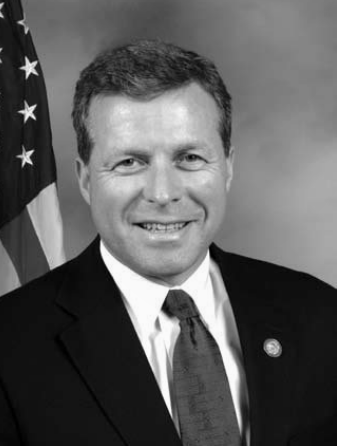
The Constitution of the United States provides that Congress has the power to “promote the progress of science and the useful arts.” As a member of Congress, I have taken up that charge by promoting a science-based solution to a serious issue.
For more than a century America’s industry, transportation sector and households have been heavily reliant on oil. The reality is that this reliance is unsustainable and inadvisable. Petroleum is a finite resource. No matter how much we explore and discover, we will one day run out, and the immediate, booming worldwide demand is burning up resources and driving up prices.
Fossil fuels emit dangerous carbon gases like carbon monoxide as they burn, polluting our air. And the increasing reliance on foreign oil subjects us to the whims of unstable geopolitical forces and unfriendly governments like Iran and Venezuela.
For these reasons, I have become an advocate of developing hydrogen as the primary fuel of our transportation-based economy.
I imagine a future where the “Hydrogen Economy” sits at the center of a multi-pronged strategy to achieve American energy independence. Hydrogen holds the promise of a home-grown energy source that will fuel our nation’s energy needs without compromising our environment. Hydrogen power is clean, emitting only water vapor. And hydrogen can be derived from renewable and non-petroleum sources.
A short time after I was elected to Congress, I joined three of my colleagues — Rep. Bob Inglis (SC-04), Rep. John Larson (CT-01) and Rep. Albert Wynn (MD-04) — to create the bipartisan House Hydrogen and Fuel Cell Caucus. On June 28, 2005, we kicked off the Caucus with an “End Dependence Day” on Capitol Hill.
Just as President Kennedy challenged us to land a man on the moon by the end of the 1960’s, I believe that developing hydrogen technology is the space race of this century.
What started with four of us now includes more than 50 members. We all are working toward the same goal – to guide government policy and resources, and to partner with private-sector and research institutions to achieve the technology of a hydrogen economy.
Among some of the goals of the Hydrogen and Fuel Cell Caucus are:
- Advocate full funding of the Department of Energy’s hydrogen programs, including existing demonstration programs.
- Fund basic science research to discover the breakthroughs needed for affordable hydrogen and fuel cell technology.
- Promote near-term use of best practices rather than premature standards that may quickly become obsolete.
- Advocate keeping hydrogen affordable and promoting means of making it widely available.
- Promote hydrogen as a safe, reliable, abundant and clean fuel.
The Caucus has been active and we’ve had successes. We have authorized billions of dollars in incentives for the development of alternative fuels, including hydrogen, and we are pressing hard to turn that funding into results.
Last July more than eighty-one members signed our letter to Energy Secretary Samuel Bodman, urging the Department of Energy to fully support hydrogen and fuel cell initiatives in the fiscal 2008 budget.
During the 109th Congress, the House of Representatives passed a bill authored by Rep. Inglis to create the H-Prize, a competitive funding program to accelerate the private development of hydrogen technology. The H-Prize Act would authorize $11 million in annual appropriations. It is modeled on science competitions of the past that proved to be highly successful, such as the Ansari X Prize, which spurred the first privately funded suborbital human spaceflight last year.
Just as President Kennedy challenged us to land a man on the moon by the end of the 1960s, I believe that developing hydrogen technology is the space race of this century. We will work hard during the 110th Congress to get this important piece of legislation signed into law.
In July 2006, I introduced my own bill, H.R. 5973, Hydrogen Transportation Wins Over Growing Reliance on Oil — known as H2 GROW, which would incentivize retail-end development of hydrogen fueling stations.
I believe the federal government’s role is to set the pace with robust support for developing hydrogen technology, just as government involvement was necessary to the construction of pipelines, refineries and other infrastructure during the petroleum era.
Private industry is already making a significant investment into the hydrogen economy. More than 50 million tons of hydrogen is produced worldwide each year. There are 46 operational hydrogen fueling stations in the Unites States, and another 17 stations are planned for implementation. Recently, Air Products and Chemicals — the largest producer of merchant hydrogen — unveiled a new “Tri-Generation Green Energy System” which will produce 300 pounds of hydrogen per day and make electricity and heat, using natural gas, propane or renewable fuel sources such as anaerobic gas from wastewater treatment plants.
Throughout the world, there is a real and growing momentum for hydrogen energy. Hydrogen buses are on the road in Iceland and continental Europe, and even some places in the United States. I’ve driven hydrogen cars and filled up the tank with hydrogen, just like filling up a conventional car with gasoline.
Most notable here in the United States is the effort by California Governor Arnold Schwarzenegger to build a “Hydrogen Highway” in Southern California. The vision of the Hydrogen Highway is to have a network of 150 to 200 hydrogen fueling stations throughout California (approximately one station every 20 miles on the State’s major highways) that would make hydrogen fuel available to the vast majority of Californians.
I have a vision that my own District in Pennsylvania will be the starting point for the Hydrogen Highway East along the 90-mile stretch of Interstate 78 from Pennsylvania’s Lehigh Valley into New York City.
With steady support from the public sector and the innovation of the private sector, the day will come soon when Americans routinely fuel up at the hydrogen station in a cleaner, stronger and safer future.
Charlie Dent represents the 15th District of Pennsylvania in the U.S. House of Representatives.




